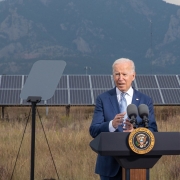Moolah from Mullahs
For decades, China and Middle Eastern autocracies have been pouring billions of dollars into American and other foreign universities. Such funds support students from their countries but can also support academic programs that propagate these countries’ world views.
China’s so-called Confucius Institutes, for instance, which push the Chinese Communist Party’s agenda on college campuses and seek access to U.S. technological prowess, have garnered much international attention. Including these institutes and other efforts, China contributed $1.2 billion to American colleges between 2014 and 2020. It has spent roughly another $1 billion since 2020.
Middle Eastern countries’ donations draw much less attention. Between 2014 and 2020, Muslim-majority countries together donated $4.86 billion to American higher-educational institutions, representing 29 percent of all foreign donations.
Qatar and Saudi Arabia were responsible for much of this largesse. The two countries together invested $3.7 billion in American higher education and were cumulatively responsible for 2,303 grants, gifts, and contracts, of which 422 exceeded $1 million and 17 exceeded $50 million in value. Most of the largest gifts came from Qatar to Cornell and Carnegie Mellon.
Qatar’s role is particularly troubling, since the country is often an ally to both Iran and Hamas. The country also backs other terrorist groups, including the Muslim Brotherhood, and is home to the most important Middle Eastern media outfit, Al Jazeera. Along with Saudi Arabia, Qatar is among the largest donors to Palestinian organizations and causes.
It’s too early to make direct connection between a school’s anti-Israel agitation and its donations from Middle Eastern countries, but the biggest recipients, such as Cornell, NYU, Georgetown, and Harvard tend to have large pro-Hamas elements. Student groups on each of those campuses have embraced the Hamas cause, most prominently at Harvard, where more than 30 student groups initially signed pro-Hamas statements, though some have since sought to dissociate themselves.
Israel’s donations to American colleges and universities have proved somewhat ironic. Between 2014 and 2020, Israel made 373 gifts to U.S. colleges and universities, together worth $124.1 million. Twenty-nine of those gifts totaled more than $1 million. Surprisingly, Yeshiva University was not among the recipients. Israel’s largest nine donations, totaling $36 million, went to Brigham Young University. Yale was the tenth-largest recipient, with a gift of $2.4 million. Harvard’s five gifts from Israel totaled $3.1 million. Medical schools such as Johns Hopkins and Albert Einstein College of Medicine were also major recipients of Israeli dollars.
Some of the Muslim-majority Middle Eastern countries’ donations may be used to stoke anti-Israel and anti-Jewish attitudes. The past decade has seen a surge of Muslim students, including large numbers whose tuitions are paid by Arab governments. These students, though a small portion of all enrollees, have often led the pro-Hamas activity on college campuses. They are frequently joined by Middle Eastern studies faculty, many of whom hold anti-Israel and anti-American views, and whose departments often receive funding from Saudi Arabia and other Gulf countries. While Americans rightfully worry about Chinese influence in our universities, we seem to think less about attracting anti-Israel and often anti-American students to our shores.
Read the rest of this piece at City Journal.
Joel Kotkin is the author of The Coming of Neo-Feudalism: A Warning to the Global Middle Class. He is the Roger Hobbs Presidential Fellow in Urban Futures at Chapman University and Executive Director for Urban Reform Institute. Learn more at joelkotkin.com and follow him on Twitter @joelkotkin.
Marshall Toplansky is a widely published and award-winning marketing professional and successful entrepreneur. He co-founded KPMG’s data & analytics center of excellence and now teaches and consults corporations on their analytics strategies.
Photo: Sam Agnew via Flickr under CC 2.0 License.


 Wafa, republished under CC 3.0 License
Wafa, republished under CC 3.0 License NREL, used under CC 2.0 License
NREL, used under CC 2.0 License

